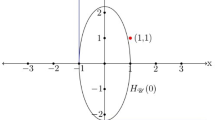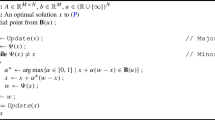Abstract
Complex systems are modeled as collections of multiobjective programs representing interacting subsystems of the overall system. Since the calculation of efficient sets of these complex systems is challenging, it is desirable to decompose the overall system into component multiobjective programs, that are more easily solved and then construct the efficient set of the overall system. For some classes of complex systems, algebraic properties of set operations and relations are developed between the efficient set of the overall system and the efficient sets of subproblems. The properties indicate that multiple decomposition and coordination schemes, with varying assumptions regarding the system, may be applied to the same initial system.
Similar content being viewed by others
Abbreviations
- ℝn :
-
The set of all n×1 real vectors
- X :
-
The feasible set
- \(\mathbb{R}^{p}_{\geqq}\) :
-
The set of all p×1 real vectors whose components are all nonnegative
- \(\mathcal{E}\) :
-
The efficiency operator, see definition (2)
- f○r:
-
Standard function composition, (f○r)(x)=f(r(x)) for all x∈X
References
Lee, S.M., Rho, B.H.: Multicriteria decomposition model for two-level, decentralized organizations. Int. J. Policy Inf. 9(1), 119–133 (1985)
Li, D., Haimes, Y.Y.: Hierarchical generating method for large-scale multiobjective systems. J. Optim. Theory Appl. 54(2), 303–333 (1987)
Li, D., Haimes, Y.Y.: Multilevel methodology for a class of non-separable optimization problems. Int. J. Syst. Sci. 21(11), 2351–2360 (1990)
Haimes, Y.Y., Tarvainen, K., Shima, T., Thadathil, J.: Hierarchical Multiobjective Analysis of Large-Scale Systems. Hemisphere, New York (1990)
Tanino, T., Satomi, H.: Optimization methods for two-level multiobjective problems. In: Lewandowski, A., Volkovich, V. (eds.) Multiobjective Problems of Mathematical Programming, pp. 128–137. Springer, Berlin (1991)
Lieberman, E.R.: Multi-Objective Programming in the USSR. Academic Press, Boston (1991)
Gomez, T., Gonzalez, M., Luque, M., Miguel, M., Ruiz, F.: Multiple objectives decomposition-coordination methods for hierarchical organizations. Eur. J. Oper. Res. 133(2), 323–341 (2001)
Caballero, R., Gomez, T., Luque, M., Miguel, F., Ruiz, R.: Hierarchical generation of Pareto optimal solutions in large-scale multiobjective systems. Comput. Oper. Res. 29, 1537–1558 (2002)
Tappeta, R.V., Renaud, J.E.: Multiobjective collaborative optimization. J. Mech. Des. 119, 403–411 (1997)
Huang, Ch.H., Bloebaum, C.L.: Multi-objective Pareto concurrent subspace optimization for multidisciplinary design. In: Proceedings of the 42nd AIAA Aerospace Sciences Meeting and Exhibit. AIAA 2004-278 (2004)
Huang, Ch.H., Bloebaum, C.L.: Visualization as a solution aid for multi-objective concurrent subspace optimization in a multidisciplinary design environment. In: Proceedings of the 10th AIAA/ISSMO Multidisciplinary Analysis and Optimization Conference. AIAA 2004-4464 (2004)
Huang, Ch.H., Bloebaum, C.L.: Incorporation of preferences in multi-objective concurrent subspace optimization for multidisciplinary design. In: Proceedings of the 10th AIAA/ISSMO Multidisciplinary Analysis and Optimization Conference. AIAA 2004-4548 (2004)
Rabeau, S., Dépincé, P., Bennis, F.: Collaborative optimization of complex systems: a multidisciplinary approach. Int. J. Interact. Des. Manuf. 1, 209–218 (2007)
Azarm, S., Sobieszczanski-Sobieski, J.: Reduction method with system analysis for multiobjective optimization-based design. NASA Contractor Report 191456—ICASE Report No. 93-22 (1993)
Lazimy, R.: Solving multiple criteria problems by interactive decompositions. Math. Program. 35(3), 334–361 (1986)
Benson, H.P., Sun, E.: Outcome space partition of the weight set in multiobjective linear programming. J. Optim. Theory Appl. 105(1), 17–36 (2000)
Wierzbicki, A.P., Granat, J., Makowski, M.: Discrete decision problems with large number of criteria. Interim Report IR-07-025, International Institute for Applied Systems Analysis, Laxenburg, Austria (2007)
Engau, A.: Domination and Decomposition in Multiobjective Programming. Ph.D. Thesis, Department of Mathematical Sciences, Clemson University (2007)
Engau, A., Wiecek, M.M.: Interactive coordination of objective decompositions in multiobjective programming. Manag. Sci. 54(7), 1350–1363 (2008)
Ward, J.: Structure of efficient sets for convex objectives. Math. Oper. Res. 14(2), 249–257 (1989)
Malivert, Ch., Boissard, N.: Structure of efficient sets for strictly quasi-convex objectives. J. Convex Anal. 1(2), 143–150 (1995)
Ehrgott, M., Nickel, S.: On the number of criteria needed to decide Pareto optimality. Math. Methods Oper. Res. 55(3), 329–345 (2002)
Popovici, N.: Pareto reducible multicriteria optimization problems. Optimization 54(3), 253–263 (2005)
Li, D., Haimes, Y.Y.: The envelope approach for multiobjective optimization problems. IEEE Trans. Syst. Man Cybern. 6, 1026–1038 (1987)
Haftka, R.T., Watson, L.T.: Multidisciplinary design optimization with quasiseparable subsystems. Optim. Eng. 6, 9–20 (2005)
Haftka, R.T., Watson, L.T.: Decomposition theory for multidisciplinary design optimization problems with mixed integer quasiseparable subsystems. Optim. Eng. 7, 135–149 (2006)
Gardenghi, M.: Multiobjective Optimization for Complex Systems. Ph.D. Thesis, Department of Mathematical Sciences, Clemson University (2009)
Faulkenberg, S.: Bilevel mathematical programs: Methodology and application in packaging. M.S. Project, Department of Mathematical Sciences, Clemson University (2005)
Author information
Authors and Affiliations
Corresponding author
Additional information
Communicated by H.P. Benson.
M. Gardenghi partially supported by the National Science Foundation Grant CMMI 0621055.
M.M. Wiecek partially supported by the National Science Foundation Grant CMMI 0621055.
Rights and permissions
About this article
Cite this article
Gardenghi, M., Gómez, T., Miguel, F. et al. Algebra of Efficient Sets for Multiobjective Complex Systems. J Optim Theory Appl 149, 385–410 (2011). https://doi.org/10.1007/s10957-010-9786-y
Published:
Issue Date:
DOI: https://doi.org/10.1007/s10957-010-9786-y




